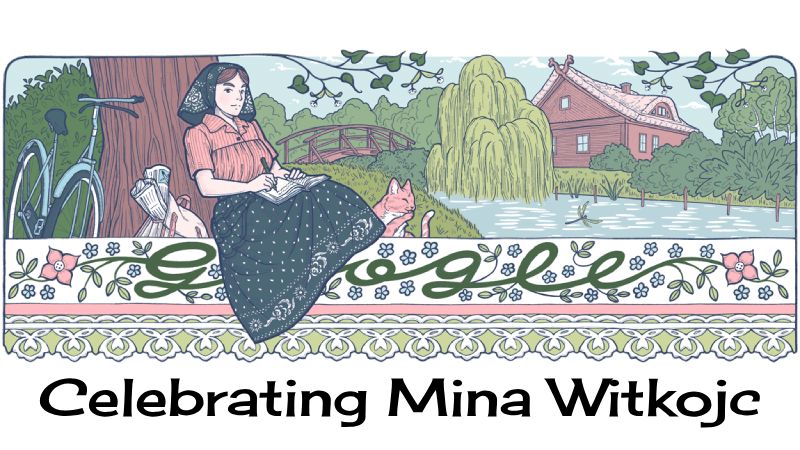Lifestyle
Interesting Facts about Mina Witkojc, a Sorbian Writer, Journalist, Poet and Activist

Today’s Google Doodle honors Mina Witkojc (Wilhelmine Wittka), a Sorbian writer, journalist, and poet regarded as one of the most significant poets and an activist for Lower Sorbian language and culture. Guest artist Siggiko created this Google Doodle, featuring Mina writing under a tree with her beloved cats. Her bicycle, which she frequently rode to get from Cottbus to Bautzen, is also featured. Witkojc was born in Burg, Germany, on May 28, 1893. Here are some interesting and amazing facts about Mina Witkojc.
35 Interesting Facts about Mina Witkojc
- Mina Witkojc, also known as Wilhelmine Wittka, was a prominent Lower Sorbian poet and publicist.
- The Wendish maid Marjana Witkojc (Marianne Wittka) and the innkeeper Fritz Pohlenz of Burg in the Spreewald were the parents of Mina Witkojc, who was born in 1893.
- She went to Burg Elementary School.
- Mina Witkojc moved to Berlin in 1907 and took jobs there as a nanny and flower arranger, among other things. She wrote her first poems in German that year.
- She began working in the armaments production industry in 1914.
- Mina Witkojc went back to Burg in 1917 and took a job as a day laborer in the agricultural sector.
- She met a group of intellectuals from the Czech and Upper Sorbian regions who were traveling in the Spreewald in August 1921, along with Arnošt Muka. She learned about her Wendish and Lower Sorbian ancestry as a result of this encounter. She had written and spoken mostly in German up until now.
- She was born and raised there, worked as a day laborer in Berlin for several years, and met some intellectuals of Upper and Lower Sorbian descent who sparked her interest in her Sorbian identity. Soon after, she relocated to Bautzen, a town with a larger Sorb population.
- In 1923, Mina Witkojc moved to Bautzen and started working on the Lower Sorbian newspaper Serbski Casnik.
- Its circulation increased from 200 to 1,200 copies during her tenure. She made numerous recommendations from Upper Sorbian intellectuals she encountered during this time, including Jan Cyž and Arnošt Muka.
- Mina Witkojc was a journalist in that Saxony town before rising to the position of chief editor of the Lower Sorbian newspaper, Serbski Casnik.
- She also worked to improve the reputation of the Wendish and Sorbian people by creating the Wendish book calendar, Pratyja.
- She composed her own poetry as well as translated poems from other Slavic languages. Her poetry frequently incorporated images of nature to convey her intense love for her native country and culture.
- Mina Witkojc translated works written in other Slavic languages into Lower Sorbian, such as Czech authors Božena Němcová and Petr Bezruč, Russian author Alexander Pushkin, and Upper Slavic writers Handrij Zejler and Jakub Bart-Ćišinski.
- Mina Witkojc was a delegate to the 1926 European Nationalities Congress in Geneva. She went to Yugoslavia in 1930 for the All-Slav Sokol meeting.
- Because of her democratic beliefs, Mina Witkojc was forced out of the Serbski Casnik’s management in 1931. The new National Socialist government forbade her from writing after that in 1933.
- When the national socialist government banned the use of Sorbian languages and banned Witkojc from writing at all, she was forced to flee Serbski Casnik. Years later, she was arrested for posting posters in Sorbian and banished from Lusatia due to residence bans.
- She went back to her former Burg residence in 1936. There, she worked as a day laborer in agriculture once more to support herself.
- Germany banned Sorbian publications in 1937. In 1941, Mina Witkojc was banned from the Dresden administrative district; in 1942, she was banned from the Frankfurt/Oder administrative district. Throughout her life, she maintained contact with intellectuals of various Slavic nationalities and consistently expressed her unwavering and fearless devotion to her homeland through her texts and poems. She was forced to leave Lusatia as a result.
- She relocated to Erfurt, where among other things she worked as an employee of a gardening business. She kept in close contact with the Wendish painter Fryco Latk and the Lower Sorbian priest Bogumił Šwjela during this period, as both had been banished from their homeland. She writes about these experiences in her long poem “Erfurtske spomnjeśa” (“Erfurt Memories”).
- Mina Witkojc went back to Bautzen in 1946 and assisted in the reconstruction of the Sorbian umbrella organization Domowina. At this time, the Cottbus SED district leadership continued to repress all Sorbian activities in Lower Lusatia.
- She thus traveled to the Wendish diaspora in the area of Varnsdorf in 1947 before moving to Prague.
- After leaving Prague in 1954, Mina Witkojc returned to her hometown of Burg.
- She continued to write after moving back to Burg in 1954 and took pride in who she was despite systematic efforts to repress her culture.
- She wrote individual poems and articles for the Lower Sorbian newspaper Nowy Casnik, as well as co-authored an anthology.
- In addition to releasing a poetry book titled K swětłu a słyńcu (To the Light, to the Sun), she published stories and poems in Nowy Casnik.
- “K swětłu a słyńcu” (“To the light, to the sun”) is a collection of poems that she published in 1955. Some of the poems are reworked versions of ones she wrote in the 1920s and 1930s before she rejected the idea of Slavic unity. For example, she wrote “Memories of the First Meeting with Czech and Upper Sorbian brothers” in her debut poem in 1921, but the 1955 version only refers to “Upper Sorbian brothers.”
- Mina Witkojc died in 1975 after spending her final months in a Papitz nursing home.
- One of the most important poets in the Lower Sorbian language is Mina Witkojc. In Lower Sorbian poetry, she had a similar groundbreaking role to that of Jakub Bart-Ćišinski, who had done so decades earlier in Upper Sorbian. Her poems convey a strong bond with her Sorbian people and the Spreewald, where she was born.
- As a publicist and editor for the Lower Sorbian book calendar “Pratyja” and newspaper “Serbski Casnik,” Mina Witkojc fostered the cultural self-assurance of the Wends/Lower Sorbs in Prussian Lower Lusatia, where centuries of strict Germanization policies had resulted in the nearly total loss of national identity.
- In 1964, Mina Witkojc received the Ćišinski Prize as a reward.
- Her name has been associated with the “Mina Witkojc Library” in Burg and the “Mina Witkojc Primary and Secondary School” since 2016.
- A street in Cottbus is named after her.
- The state of Brandenburg gave the Mina Witkojc Prize every two years to recognize Sorbian/Wendish linguistic dedication since 2018. The Mina Witkojc Award is presented to activists of the Sorbian language.
- Google recognized Mina Witkojc in 2024 with a Google Doodle in his honor.
-

 Gadget4 weeks ago
Gadget4 weeks agoAfter Grand Success on BLDC Ceiling Fan, Eff4 Is Launching Smart Bulb
-

 Festivals & Events4 weeks ago
Festivals & Events4 weeks agoGoogle Celebrates Cherry Blossom Season with Animated Doodle
-

 Business2 weeks ago
Business2 weeks agoPrakash and Kamal Hinduja: Driving Social and Environmental Change
-
Education3 weeks ago
Fred DuVal: University Leadership as a Critical Resource for Climate Change Research and Life-Saving Solutions
-

 Health2 weeks ago
Health2 weeks agoThe Hinduja Brothers Commitment to Global Health: Empowering Communities Across Borders
-

 Cryptocurrency3 weeks ago
Cryptocurrency3 weeks agoDesigned For The Masses: How Akasha (AK1111) Is Unlocking Crypto For The Next Billion Users
-

 Cryptocurrency3 weeks ago
Cryptocurrency3 weeks agoNexaglobal & Future World Token (FWT): Could This Be the Next Big Crypto Investment of 2025?
-

 Sports4 weeks ago
Sports4 weeks agoWomen’s NCAA Tournament 2025 Sweet 16: Full Schedule, Fixtures, Teams, Bracket, and How to Watch March Madness Basketball Match Live























